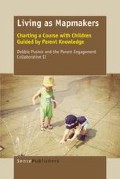Abstract
Just like the King, it is common for educators to leave parents and family members to their own, learning little about them. Hollands, in Chapter 14, reflecting on the positioning of parents in relation to school landscapes, looked back to her own childhood and noted that her parents were not invited into her classroom space or her school when she was a little girl.
Access this chapter
Tax calculation will be finalised at checkout
Purchases are for personal use only
Preview
Unable to display preview. Download preview PDF.
References
Belenky, M. F. (1996). Public homeplaces: Nurturing the development of people, families, and communities. In N. Goldberger, J. Tarule, B. Clinchy,& M. Belenky (Eds.), Knowledge, difference, and power (pp. 393–430). New York, NY: Basic Books.
Clinchy, B. M. (1996). Connected and separate knowing. In N. Goldberger, J. Tarule, B. Clinchy,& M. Belenky (Eds.), Knowledge, difference, and power (pp. 205–247). New York, NY: Basic Books.
Domingue, R. (2013). The mapmaker’s war. New York, NY: ATRIA Books.
Findley, T. (1990). Inside memory: Pages from a writer’s notebook. Toronto, ON: HarperCollins.
Huber, J., Graham, D., Murray Orr, A.,& Reid, N. (2010). Literature conversations for inquiring into the influence of family stories on teacher identities. In M. Miller Marsh& T. Turner-Vorbeck (Eds.), (Mis)Understanding families: Learning from real families in our schools (pp. 79–94). New York, NY: Teachers College Press.
Loomba, A. (1998). Colonialism/postcolonialism. New York, NY: Routledge.
Noddings, N. (2009). Responsibility. LEARNing landscapes, 2(2), 17–23.
Polanyi, M. (1958). Personal knowledge: Towards a post-critical philosophy. Chicago, IL: University of Chicago Press.
Pushor, D. (2001). A storied photo album of parents’ positioning and the landscape of schools (Unpublished doctoral dissertation). University of Alberta, Edmonton, AB.
Pushor, D. (2007). Parent engagement: Creating a shared world. Invited research paper, 2nd Annual Ontario Ministry of Education Research Symposium. Toronto, ON: Ontario Ministry of Education. Retrieved from http://www.edu.gov.on.ca/eng/research/pushor.pdf
Pushor, D.,& Ruitenberg, C., with Co-researchers from Princess Alexandra Community School. (2005). Parent engagement and leadership (Research report, project #134). Saskatoon, SK: Dr. Stirling McDowell Foundation for Research into Teaching. Retrieved from http://www.mcdowellfoundation.ca/main_mcdowell/projects/research_rep/134_parent_engagement.pdf
Soueif, A. (1999). The map of love. London, GB: Bloomsbury Publishing.
Rights and permissions
Copyright information
© 2015 Sense Publishers
About this chapter
Cite this chapter
Ryan, D. (2015). The Map Changes, The Mapmaker Changes. In: Living as Mapmakers. SensePublishers, Rotterdam. https://doi.org/10.1007/978-94-6300-361-2_16
Download citation
DOI: https://doi.org/10.1007/978-94-6300-361-2_16
Publisher Name: SensePublishers, Rotterdam
Online ISBN: 978-94-6300-361-2
eBook Packages: Humanities, Social Sciences and LawEducation (R0)

